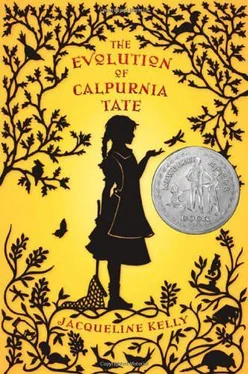Jacqueline Kelly - The Evolution of Calpurnia Tate
Здесь есть возможность читать онлайн «Jacqueline Kelly - The Evolution of Calpurnia Tate» весь текст электронной книги совершенно бесплатно (целиком полную версию без сокращений). В некоторых случаях можно слушать аудио, скачать через торрент в формате fb2 и присутствует краткое содержание. Город: New York, Год выпуска: 2009, ISBN: 2009, Издательство: Macmillan : Henry Holt and Company, Жанр: Детская проза, на английском языке. Описание произведения, (предисловие) а так же отзывы посетителей доступны на портале библиотеки ЛибКат.
- Название:The Evolution of Calpurnia Tate
- Автор:
- Издательство:Macmillan : Henry Holt and Company
- Жанр:
- Год:2009
- Город:New York
- ISBN:978-0-8050-8841-0
- Рейтинг книги:5 / 5. Голосов: 1
-
Избранное:Добавить в избранное
- Отзывы:
-
Ваша оценка:
- 100
- 1
- 2
- 3
- 4
- 5
The Evolution of Calpurnia Tate: краткое содержание, описание и аннотация
Предлагаем к чтению аннотацию, описание, краткое содержание или предисловие (зависит от того, что написал сам автор книги «The Evolution of Calpurnia Tate»). Если вы не нашли необходимую информацию о книге — напишите в комментариях, мы постараемся отыскать её.
The Evolution of Calpurnia Tate — читать онлайн бесплатно полную книгу (весь текст) целиком
Ниже представлен текст книги, разбитый по страницам. Система сохранения места последней прочитанной страницы, позволяет с удобством читать онлайн бесплатно книгу «The Evolution of Calpurnia Tate», без необходимости каждый раз заново искать на чём Вы остановились. Поставьте закладку, и сможете в любой момент перейти на страницу, на которой закончили чтение.
Интервал:
Закладка:
Chapter 23
THE FENTRESS FAIR
How fleeting are the wishes and efforts of man! how short his time! and consequently how poor will his products be, compared with those accumulated by nature. . . .
I HAD NO CHOICE. Miss Harbottle had proposed the motion on the floor that all the girls in school enter handiwork in the fair, and Mother had seconded it. So Mother and Viola came to my room and inspected the various projects that I had laid out on my bed. There were three pairs of brown woollen socks for my brothers, a crocheted baby’s jacket to give to the poor, and an asymmetrical tatted lace collar, rather awkward on the side where I’d begun it and somewhat tidier where I’d finished up. I also had a piece of pathetic quilting so primitive that it looked like it had been done by Toddy Gates, Lula’s addle-brained brother. Mother shuddered and turned away, and she and Viola conferred and clucked over the remaining pieces. With much sighing, they chose the tatted collar.
Mother mused absently as she wrapped it in tissue paper, “I wonder if the family name has to go on it.” She looked up and saw our shocked expressions and said hastily, “Of course it does.”
On reflection, anonymity sounded like a fine idea to me, and I said, “Do you think I could enter anonymously? That would be all right with me.”
Mother flushed and said, “Don’t be silly. You should have thought of that while you were making it, young lady. Of course your name—our name—will be on it.” Still, she looked thoughtful. But whether she did or did not ask Miss Harbottle if this was possible, it didn’t matter. My name was going to be stuck on my work. I knew it served me right.
None of the boys had been forced to enter anything, but Travis voluntarily entered his Angora rabbit, Bunny. Bunny was an enormous, docile, fluffy white creature that Travis combed regularly for his silky hair, which he then gave to a local spinner, who in turn re-presented it to Mother in the form of the world’s softest wool. Travis had briefly considered entering a calf in the yearling division, but fortunately Harry had had the presence of mind to point out to him what inevitably happened to the winning specimens in the cattle divisions. Following this, Travis had driven us, and the fair organizers, mad with his obsessive checking and rechecking that Bunny was entered in the rabbit/fur competition and not the rabbit/meat competition.
Sam Houston had carved a recognizable profile of President McKinley out of pecan wood, a difficult wood to work, and entered it in the juvenile whittling division.
Except for my pathetic entry, it was bound to be a stupendous day, especially since we all had some money in our pockets saved up from working at the gin; I still had fifteen cents left over from babysitting during the harvest, despite subcontracting to Sul Ross. I considered spending some of it on a brand-new drink we’d all heard about, Coca-Cola.
The day dawned clear, and although we had to travel only a mile to the other end of town, the whole family, including Granddaddy, piled into the long-bed wagon. Travis held Bunny on his lap in a chicken-wire cage that was too small for him. The rabbit’s fur pressed through the wire, and white wisps of it floated away in the sunlight like tiny clouds. We parked among a motley collection of farm wagons and gigs and dogcarts pulled up higgledy-piggledy on the grassy field adjoining the many tents.
Mother gave us our final instructions before we scattered. Travis took Bunny off to the Small Livestock tent, and I headed for Domestic Arts with my entry safely shrouded in brown paper so that no one could see it.
I went by the cakewalk in a marquee festooned with many curls of flypaper. Along with the cakes, various young ladies of the county had prepared picnic lunches, and whoever bid highest on the lunch got to sit with the young lady to enjoy her company and share the delectables from her hamper. All the money raised went to the Volunteer Fire Department. I guess this was the rusticated equivalent of coming out.
I hurriedly dropped off my entry and went wandering around. The Odd Fellows’ band wheezed away, pumping out a steady supply of festive waltzes and marches that could be heard all over the grounds. I saw my brothers here and there in the crowd, and some of my friends from school. I watched Sam Houston win a tin whistle at the ring toss, and later I saw one exactly like it in Lula’s hand, although she seemed to be holding it limply and not paying it much attention.
I passed a pavilion with a sign out front—HOFACKET’S FINE PHOTOGRAPHS FOR FINE OCCASIONS—and there was the photographer himself, having set up a temporary shop to catch business from fair-goers dressed in their good clothes with money jingling in their pockets. He was too busy posing a young couple to notice me, which was lucky. I’d received another letter from him inquiring after word about the Plant, and then yet another before I’d had a chance to answer the previous one, and it was all getting annoying. How quickly the bloom had gone off the whole idea of scientific correspondence.
Then I made my way to the Domestic Arts tent, which smelled of enticing baked goods. Mayor Axelrod got up with a megaphone on the platform at the front and started calling out the winners, starting with the novice classes. We ran through breads, breads/fancy, pies/fruit, and pies/otherwise, and then he began on the handiworks.
He consulted his list and called out, “In third place, Novice Tatting, Miss Calpurnia Virginia Tate!”
What? What?
“Calpurnia Tate, where are you? Come on up here!” he shouted.
In shock, I threaded my way through the onlookers and climbed up on the platform. There was some light applause from the crowd and a conspicuous lusty cheer from the back of the tent that could only have come from a clump of my brothers. Mr. Axelrod pinned the white ribbon to my dress. Mother was nowhere to be seen.
“In second place, Miss Dovie Medlin!”
Dovie simpered her way up and stood next to me while the mayor pinned on her red ribbon. She sniggered and admired it. I was mightily relieved that she hadn’t won; she was bordering on unbearable as it was. I almost expected her to turn and stick her tongue out at me. She was just that type.
“Ladies and gentlemen, boys and girls, the first place ribbon in the novice tatting category goes to . . . Miss Lula Gates! Let’s have a big cheer for Miss Lula Gates!”
Lula came up. I wanted her to stand next to me, but she had to stand next to Dovie while they pinned her blue ribbon on her. I was still in shock and looked down at the upturned faces in the tent, trying to find my family. How had I won a ribbon? My tatting was nothing to write home about. After a final round of applause, I stumbled back down off the stage to pats on the back and words of congratulations.
“Well done, Lula,” I said, always the good sport, especially in a contest where there was absolutely no chance of my winning. “You deserve to win. Your tatting’s the best.”
“How would you know?” said Dovie, flouncing by. I would have punched her except that there were too many witnesses.
Lula graciously said, “Thank you, Callie. I’m sure you deserve a ribbon too.”
“The trouble is that I don’t,” I said. And I didn’t, although Mother would probably faint with happiness when she heard. Mrs. Gates came up to us, flushed with pleasure.
“Well, girls,” she said, “this is certainly a fine occasion.”
“Hello, Mrs. Gates,” I said. “Lula did a good job. She deserved to win.”
“Thank you, Calpurnia. I’m sure you deserve a prize as well,” said Mrs. Gates.
“Hmm,” I said, doubtfully. “Have you seen my entry, ma’am? Do you want to go look at the other work?”
Читать дальшеИнтервал:
Закладка:
Похожие книги на «The Evolution of Calpurnia Tate»
Представляем Вашему вниманию похожие книги на «The Evolution of Calpurnia Tate» списком для выбора. Мы отобрали схожую по названию и смыслу литературу в надежде предоставить читателям больше вариантов отыскать новые, интересные, ещё непрочитанные произведения.
Обсуждение, отзывы о книге «The Evolution of Calpurnia Tate» и просто собственные мнения читателей. Оставьте ваши комментарии, напишите, что Вы думаете о произведении, его смысле или главных героях. Укажите что конкретно понравилось, а что нет, и почему Вы так считаете.












